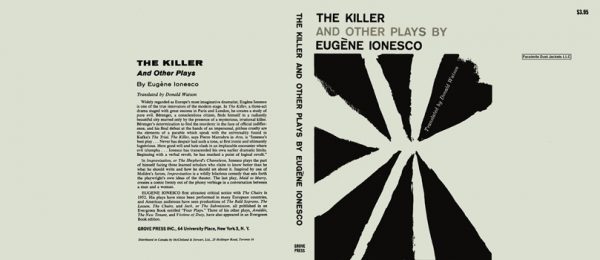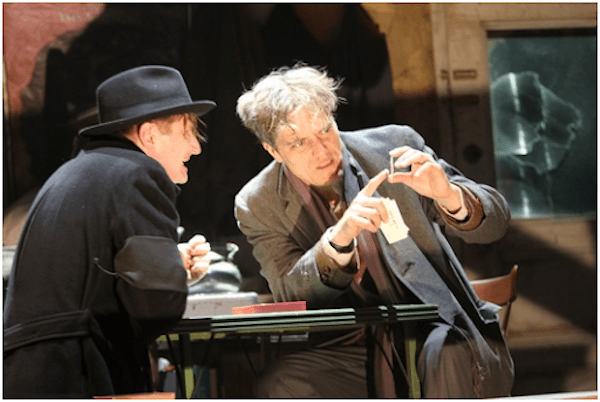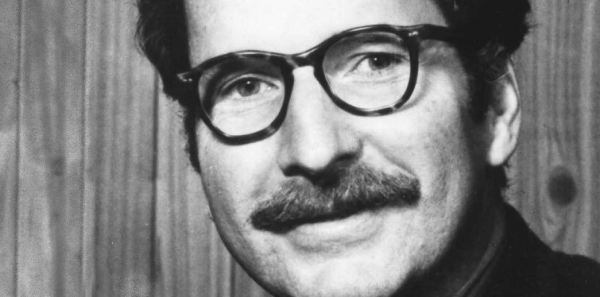Arts Commentary: Two “Killer” Worldviews
By Jeff Zinn
I’m suddenly startled by the almost simultaneous appearance of two killers, neither of them COVID-19, each seemingly unbeatable in its own way.

In Eugène Ionesco’s 1958 play The Killer, a nebbishy Everyman named Bérenger takes the wrong train and lands in a “radiant city” full of beauty, full employment, and love just around the corner. Very soon though, he discovers that this perfect place is not so perfect after all; a killer stalks the land, striking at random. Bérenger tracks down the killer and then spends many pages trying to talk him out of his profession, employing various arguments and rhetorical strategies. Eventually he gives up and is himself killed. The end. The Killer isn’t produced much. (The most recent professional American production was in 2104, featuring a translation by critic Michael Feingold.) Why do I bring it up? Because the thing that propels Bérenger through much of the play is not his self-proclaimed desire to restore the radiant city to its former perfection, nor to assert the many high-minded values he argues for as he faces down the killer. It’s death itself that terrifies him and that he attempts, vainly of course, to talk into submission.
I’m suddenly startled by the almost simultaneous appearance of two killers, neither of them COVID-19, each seemingly unbeatable in its own way. These killers are competing worldviews and, as we know, toxic worldviews can be just as deadly, easily spread, and difficult to mitigate.
Let me explain.
For all of the much-noted red state/blue state divisions in our society, for a brief moment it seemed as though the prospect of a virus that infects indiscriminately might, at least partially, level the civic space. Fat chance. Very quickly now, we witness the exact same divisions at play: science vs nonscience (pronounced “nonsense”), urban vs rural, coastal vs flyover, etc. The allegiances have even become visible in a way they hadn’t before; suddenly we’re living in a masks vs no masks world straight out of Watchmen. (That was fast.) People are marching in the streets demanding to be allowed to not social distance and, as long as we’re here, lets show our guns and wave the Confederate flag. Hell, let’s wave a swastika and really own the libs.

Paul Sparks and Michael Shannon in a scene from a 2014 production of The Killer. Photo: Gerry Goodstein.
You want to shout at those people, are you fucking crazy? You’re all going to get sick and maybe die! But this new faux “liberation” movement is, again, bound up in the cult of Trump, who has been winking so blatantly at them, even through the occasional somber pronouncement, that they TOTALLY got the message long ago that this was all a big hoax. Of course, they think Trump is a genius, handling it all brilliantly, and the Dems, libs, and media are just out to get him. It’s just one more Trump wall to take a stand on. How could they be so deluded? How could they put themselves and their loved ones at risk for the sake of defending Trump and all he stands for?
And the other killer? Well, my brothers and sisters on the far left (that is, to the left of me) are putting all of us and themselves at mortal peril by not doing EVERYTHING in their power to defeat Donald Trump in November and, while we’re at it, take back the Senate too. As we barrel toward November 7, spending one minute ragging on Joe Biden for any one of a number of his failings is, to my mind, like doctors, nurses, and orderlies standing around the bottom of a stairwell at a hospital — stuffed with COVID-19 patients — complaining about the color of the PPEs they’ve been given. Life and death, people! Move your asses! How can they be so deluded?
In both cases we witness a self-defeating adherence to ideology that seems to trump even self-interest. What is the great psychological engine that drives such behavior?
As I wonder at the seeming impenetrability of the worldviews, torturing my brain for the spot-on metaphors that might persuade my friends who fancy themselves true revolutionaries and the smaller group of Trumpists I still speak to, I realize that what we are living through exemplifies the core principles I wrote about in my book The Existential Actor: Life and Death, Onstage and Off, which was itself no more than the stepchild of the book that inspired it, Ernest Becker’s The Denial of Death. He made the case that all of our most deeply held beliefs, the cultural worldviews, political and sports team allegiances, nationalities and neighborhoods with which we identify and for which we FIGHT, all of them are nothing but culturally constructed edifices that allow us to feel we are at least symbolically immortal. They are the means by which we can conquer death, which is our greatest fear. Fighting to defend a belief system becomes a matter of symbolic, if not literal, life and death. The crushing of a belief system, either by violence or argument or by political process, becomes emblematic of mortality. It can also mean actual death when transposed to conflicts where real territory or resources are at stake. Even then, ideology fuels the fires because belief systems are, more than anything, psychologically essential.
I leaned on Becker to develop an approach to working on plays that might help actors connect to characters whose motivations they might otherwise have difficulty understanding. In rehearsal we talk a lot about “the stakes” and we always want those stakes to be a matter of life and death (even when they’re not, it’s way more entertaining if they are.) When we begin to appreciate that each person, no matter what cultural “shape” they might take – rich, poor, black, white, brown, red state, blue state, educated or less so – is at all times in the process of constructing and defending an identity that provides a sense of purpose, a sense of literal or symbolic immortality, we can begin to infuse that sense of life and death struggle into our work. Those shapes provide the psychological armor that shields us from the truth that we are, in fact, insignificant specks of living matter, hurtling through an uncaring universe, clinging to the back of another speck of sand that will itself someday be obliterated and cease to exist. When, as actors, we are able to get in touch with that primal need to construct and defend identity, even in a comedy or rom-com, the work takes on the aspect of a life-and-death struggle.

Ernest Becker –for him, fighting to defend a belief system becomes a matter of at least symbolic, if not literal, life and death.
Worldviews, especially when supported by groups, allow us to feel that we are strong, as opposed to insignificant nothings no more significant than a cockroach or a cucumber (see Sheldon Solomon, Jeff Greenberg, and Tom Pyszczynski’s book The Worm at the Core). Notice how often the words “tough” and “strong” are used during these days of plague: we are New York Tough, Boston Strong, etc. A woman describing the death of her mother talks about how tough she was to the end. Actor Brian Dennehy, who just died, apparently inflated his war record in Viet Nam. Toughness was such an important part of his brand he felt the need to plump it up. “Tough guy” is one of Trump’s favorite compliments. But none of us are truly that tough. I’ve read that the most commonly spoken last words are “mommy.” Culturally endowed worldviews allow us to play tough in the face of the terror that accompanies death awareness.
An entire discipline of Experimental Social Psychology has emerged to test Becker’s hypothesis. Led by the aforementioned Solomon, hundreds of peer-reviewed studies have been conducted and they point to a similar outcome and conclusion: mentions and images of death remind us of our mortality, and our defense is to wed ourselves more strongly to the belief systems that buffer us from the certainty of our finitude. In one study, a group of municipal judges were asked to set bail for women in hypothetical prostitution cases. Half the judges were first asked to write a short essay describing how they imagined their last moments before dying. The other half were asked to describe their favorite TV show. The bail set by the group subjected to thoughts of their own death was 400% higher than the control group.
And here we are, suddenly the subjects of the grandest mortality salience experiment ever. COVID-19 is killing our friends, families, neighbors, celebrities, the homeless, the rich, the poor, the healthy, those with preconditions; in short, everyone. Everyman. We are all Bérenger. The Radiant City is a mirage. Mortality is suddenly front and center in the national consciousness — which means worldview adherence and defense is similarly off the charts. No wonder we are unable to convince anyone of anything. The stakes are just too high.
How does this knowledge help us in the here and now? Do we lean on Elisabeth Kübler-Ross’s final stage and simply accept Trump and Trumpists? Do we simply accept Bernie Bros who refuse to compromise, ready to march straight toward incoming fire to certain electoral defeat in order to defend a worldview that is unquestionably “right?” Or do we keep fighting, reaching for yet another metaphor, another persuasive argument? I wish I had the answer. Sometimes I feel like a character trapped in one of Samuel Beckett’s existential dead-ends:“You must go on. I can’t go on. I’ll go on.”
Jeff Zinn is best known as the former Artistic Director of Wellfleet Harbor Actors Theater (WHAT) and the author of The Existential Actor: Life and Death, Onstage and Off (Smith and Kraus, 2015).

I envy you your writing.
Language, abstraction, always becomes corrupted. It signals the collapse of empire. The more vulnerable the leaders become, the more they deceive and mislead the led. It comes down to who’s going to control citizen consciousness? And how, and when? Anxiety, distraction, confusion and fragmentation are the methods they use, individually and in conjunction. Nice trick, the dialectic. The led lose trust, stop investing, abandon creativity/proactivity, adopt fear-based, reactive beliefs, and the society falls into chaos and anarchy. Coming to a theater near you!
As E.F. Schumacher explained, life is a divergent problem, not a convergent problem. Alternative ideas about how to avoid death ALL involve the avoidance of life. The two killer world views are both wrong in that they’re both ends-oriented (and deny that the end is unachievable). Our destiny will be determined by our means, not our ends. What you BE determines what you DO. You want to live forever? Acknowledge that there’s no such thing as linear time! To be here now is to be here forever!
Excellent piece.
I’ll go on.